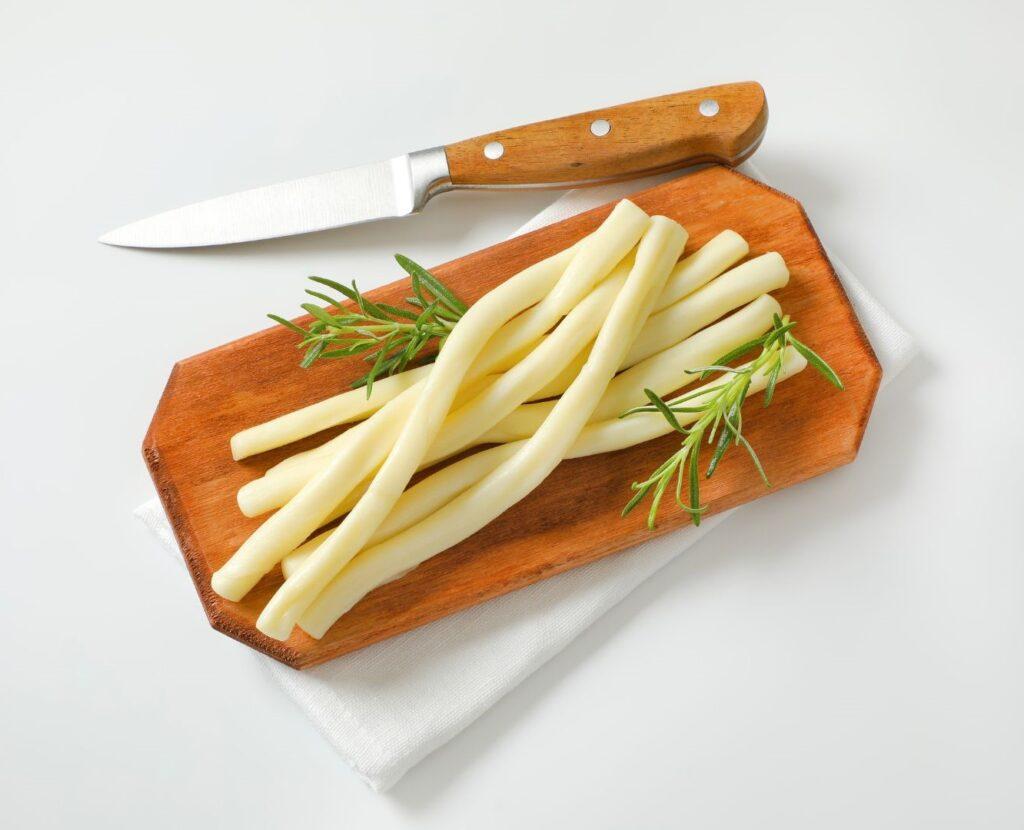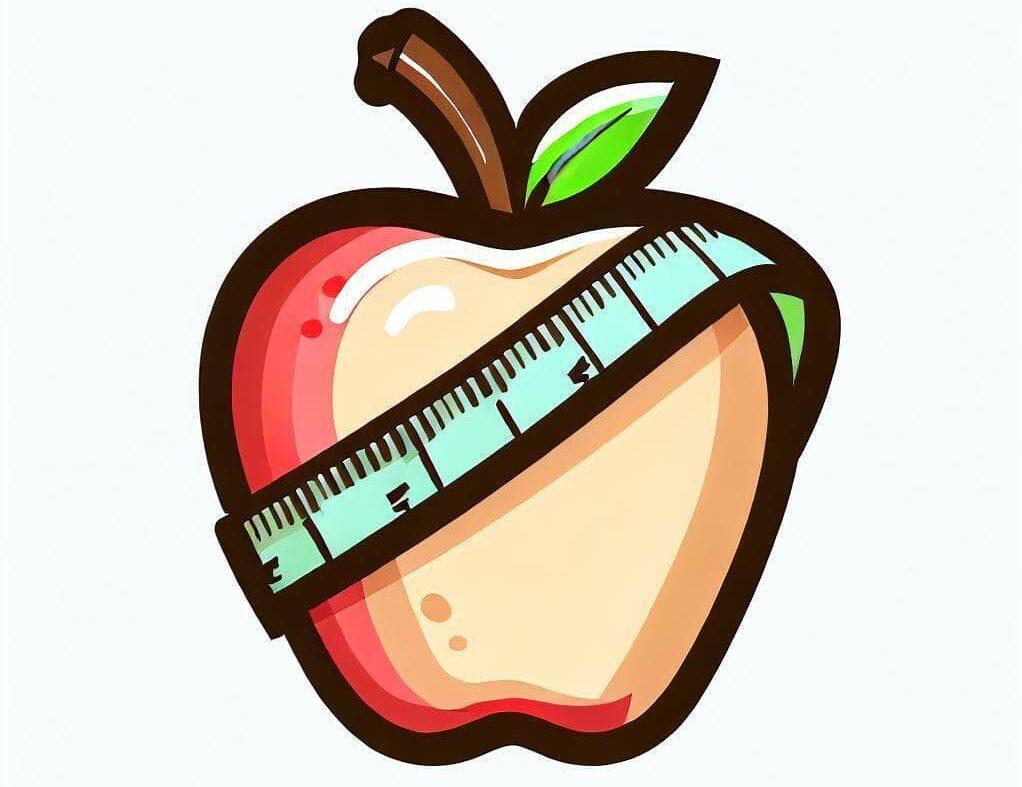Is String Cheese Good for Weight Loss?
This post may contain affiliate links which means I may receive a commission for purchases made through links at no extra cost to you. See my disclosure policy for more information.

Yes, string cheese is ok to eat for weight loss, primarily because it’s high in protein and fat. These nutrients promote a sense of fullness, helping to curb hunger for an extended period.
This can be particularly beneficial for those who tend to snack frequently.
Opting for a high-fat snack like string cheese, instead of reaching for a bag of chips or candy, can be a smarter choice. Chips and candy don’t really satiate you and often lead to further snacking.
However, it’s important to note that, like all cheeses, string cheese is also high in calories and sodium.
Therefore, it’s advisable to consume it in moderation, ideally limiting it to 1 – 2 sticks as a snack. Why is it important to limit the intake? I’ll delve into this in more detail in the article.
Note that I won’t be talking about any health benefits of string cheese, so if you were here for that this post isn’t for you. This article is strictly about string cheese and losing weight.
Nutritional Value Of String Cheese
As per the USDA 1 stick of mozzarella string cheese contains the following nutrients.
Serving Size: 1 stick (28 g)
Calories: 85
Carbohydrates: 1.3g
Fat: 5.8g
Protein: 6.7g
Fiber: 0g
Sugars: 0.5g
Sodium: 198mg
Potential Benefits Of String Cheese For Weight Loss
If you’re looking for a long list of how string cheese helps with weight loss, you might not find what you’re expecting. I see just one main benefit to it:
It Can Make You Feel Full (only benefit)
Yep. The only benefit of string cheese for weight loss lies in its high protein and fat content. Often, the word ‘fat’ is perceived negatively, but it’s important to consider the type of fat.
String cheese, with its significant protein and fat content, can actually promote a feeling of fullness. Indeed, studies have shown that protein and fat can activate satiety hormones.
Protein increases the levels of satiety hormones such as GLP-1 (glucagon-like peptide-1), PYY (peptide YY), and CCK (cholecystokinin).
Fat, on the other hand, digests more slowly, delaying the body’s release of hunger hormones. This means that after consuming high-fat food like string cheese, you’re likely to feel less hungry compared to eating high-carb foods like a muffin.
Also Read: Is Mac and Cheese Good For Weight Loss?
Downsides of String Cheese For Weight Loss
There are actually more downsides of string cheese than the benefits. But these downsides can be managed as long as you eat it in moderation. So here are the downsides.
Its Calories Can Quickly Add Up
While a single stick of string cheese contains only 85 calories, it’s easy to overindulge, especially if you’re sitting in front of the TV watching Netflix. You might find yourself consuming more than intended, perhaps 4 or 5 sticks.
The issue here is that without moderation, these calories can quickly accumulate. When aiming for weight loss, it’s essential to maintain a caloric deficit, meaning you should consume fewer calories than your body requires to maintain its current weight.
For instance, if your body needs 2000 calories to maintain its weight, you might aim for around 1700 calories.
Staying in a caloric deficit requires careful attention to your intake. So, it’s not that the calories in string cheese are problematic on their own; the concern is that the calories can add up without careful moderation.
It Has Moderately High Levels of Sodium
High sodium content can temporarily cause you to gain weight and look all bloated and puffy. This is because when you consume too much sodium, your body holds onto more water.
This happens because your body tries to keep a balance between the salt and water levels. So, if there’s a lot of salt, you need more water to balance it out.
Your kidneys, which usually get rid of extra water, start holding onto it instead. This extra water in your body can make you weigh more.
It’s not fat, just extra water that your body is keeping because of the excess sodium intake.
It’s High In Saturated Fat
String cheese contains approximately 3.3 grams of saturated fats per serving, which is about 17% of the recommended daily limit.
Saturated fat is known to raise LDL (bad) cholesterol levels, increasing the risk of heart disease and stroke.
While this isn’t directly linked to weight loss, it’s crucial to consider overall health, especially if you have existing heart issues or hypertension, where your arteries may already be inflamed.
Consuming foods high in saturated fat could further jeopardize your health.
When your health is compromised, it becomes more challenging to adhere to a weight loss routine. Therefore, it could indirectly affect your weight loss efforts.
Also Read: Is Pepperoni Good For Weight Loss?
String Cheese Vs Other Kinds Of Cheese
| Type of Cheese | Calories | Protein (g) | Fat (g) | Carbs (g) | Calcium (%DV) | Sodium (%DV) |
| String Cheese | 85 | 6.7 | 5.8 | 1.3 | 20% | |
| Mozzarella [1] | 85 | 6 | 6 | 1 | 11% | 6% |
| Blue Cheese [2] | 100 | 6 | 8 | 1 | 12% | 14% |
| Feta [3] | 75 | 4 | 6 | 1 | 11% | 14% |
| Cottage Cheese [4] | 23 | 3 | 0.8 | 1.3 | 2.3% | 4% |
| Ricotta [5] | 42 | 2 | 2.9 | 2 | 4.5% | 1.4% |
| Parmesan [6] | 111 | 10 | 7 | 1 | 26% | 15% |
| Swiss Cheese [7] | 111 | 8 | 9 | <1 | 19% | 2% |
| Cheddar [8] | 115 | 7 | 9 | 1 | 15% | 8% |
| Goat Cheese [9] | 75 | 5 | 6 | 0 | 3% | 6% |
Also Read: Is Spam Good For Weight Loss?
Tips To Add String Cheese In A Weight Loss Diet
Eat in Moderation
It’s important to limit your intake of string cheese to about 1 – 2 servings per day.
This is because each serving contains calories that, although small individually, can accumulate quickly if consumed in large quantities.
By keeping your consumption moderate, you can enjoy the benefits of string cheese without overloading on calories, which is crucial for getting to a healthy weight.
Meal Planning
String cheese is a convenient snack option and its portability makes it an excellent choice for busy individuals who need a quick protein boost.
For instance, you can add string cheese to salads or wraps to increase their protein content or pair it with fresh fruits for a balanced snack.
Pairing it with whole-grain crackers and hummus can also create a balanced snack that combines protein, fiber, and healthy fats, contributing to a feeling of fullness and reducing the likelihood of overeating.
Limit or Avoid If You Have Pre-existing Conditions
If you have a history of cardiovascular diseases or hypertension, it’s advisable to be cautious with string cheese.
These conditions can be exacerbated by high sodium and saturated fat intake, both of which are present in string cheese.
Opting for low-sodium and organic varieties can be a safer choice, as they typically contain fewer additives and artificial flavors.
These healthier options can help manage your condition while still allowing you to enjoy string cheese in moderation.
Timing Matters
The timing of when you eat string cheese can also play a role in weight loss. Having it as a mid-morning or mid-afternoon snack is a strategic way to manage hunger.
It can provide a protein-rich boost that keeps you satisfied until your next main meal, reducing the likelihood of overeating or indulging in less healthy snack options.
This can be particularly beneficial for maintaining a consistent energy level throughout the day and for sticking to a structured eating plan.
Also Read: Is Caprese Salad Good For Weight Loss?
Alternatives To String Cheese For Weight Loss
Hard Cheeses (like Extra-sharp cheddar, Gorgonzola, Parmesan, and Asiago)
These cheeses are packed with good stuff like protein and calcium.
They have strong flavors, so a little bit goes a long way in satisfying your taste buds. This helps you eat less.
The protein and calcium in these cheeses might help your body burn energy a bit faster.
Goat Cheese
Goat cheese has less fat and fewer calories than most cheeses made from cow’s milk. This makes it a lighter choice if you’re watching your weight.
The fat in goat cheese is different. It gets used up by your body quicker and is less likely to be stored as fat.
Low-Fat Cheeses
These cheeses have less fat, so they also have fewer calories. This is helpful if you’re trying to eat fewer calories to lose weight.
Even though they’re low in fat, they can still make you feel full because of their protein content.
Cashew Cheese
You can make this cheese at home using cashews and nutritional yeast. It’s a healthier option because you know exactly what’s in it.
Cashews are good for you. They have healthy fats, protein, and minerals.
You can use cashew cheese in many ways, like a spread or a sauce. It adds flavor to your food without adding lots of calories and fat.
Also Read: Are Slim Jims Good For Weight Loss?
Conclusion
The main point is that string cheese can be good for weight loss, but you have to eat it in moderation. Because it’s cheese, it’s made of fat, and fat has more calories (9 calories per gram).
So, string cheese isn’t really low in calories. But like I said before, if you keep it to just 1 – 2 pieces a day and use it to help control your hunger, it should work out fine for your weight loss goals
FAQ
Can I eat string cheese while on a diet?
Yes, you can eat string cheese while on a diet. It’s a good source of protein and calcium, and its portion-controlled packaging can help with mindful snacking.
What is the best cheese for weight loss?
The best cheese for weight loss is typically one that is lower in calories and fat, such as part-skim mozzarella, cottage cheese, or a reduced-fat variety. These cheeses provide protein and nutrients without too many extra calories.
How many string cheeses can I eat a day?
The number of string cheeses you can eat a day depends on your overall calorie needs and dietary goals. Generally, one to two servings can be included as part of a balanced diet.
Are cheese sticks good for a diet?
Cheese sticks can be good for a diet as they are portion-controlled and can provide a satisfying, protein-rich snack. Opt for versions that are lower in fat and sodium to align better with weight loss or health-focused diets.
This post may contain affiliate links which means I may receive a commission for purchases made through links at no extra cost to you. See my disclosure policy for more information.
Rahul is a professional nutritionist certified by the International Sports Sciences Association (ISSA) and a personal trainer certified through the American Council of Exercise (ACE). He has a special interest in the science of nutrition and how it can impact the body.
